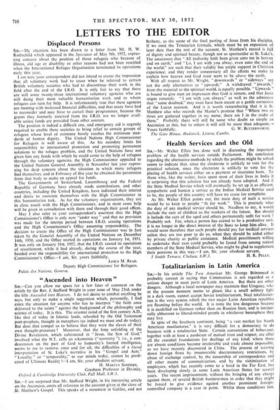Sm,—I am surprised that Mr. Stafford Wright, in his interesting
article on the Ascension, omits all reference to the account given at the close of St. Matthew's Gospel. This speaks of a mountain in Galilee, and not Bethany, as the scene of the final parting of Jesus from his disciples. If we omit the Trinitarian formula, which must be an expansion of later date than the rest of the account, St. Matthew's record is full of dignity and spiritual beauty, though not so spectacular as St. Luke's. The assurances that " All authority hath been given unto me in heaven and on earth," and " Lo, I am with you alway, even unto the end of the world," are such that their validity has ample support in Christian experience; and they render unnecessary all the efforts we make to explain how heaven and God must seem to be above the earth.
With all respect to Mr. Wright, " downwards " or " sideways" are not the only alternatives to " upwards." A withdrawal " inwards," from the material to the spiritual world, is equally possible. " Upwards" is bound to give men an impression that God is remote, and that Jesus reigns remotely. " I am with you always," as well as the admission that " some doubted," may even have been meant as a gentle correction of the Lucan account. And it is worth remembering that it is St. Matthew also who records the Master's promise that " Where two or three are gathered together in- my name, there am I in the midst of them." Probably 'there will still be some who doubt so simple an Ascension as this, but to others it will still be more than adequate.—,










































 Previous page
Previous page